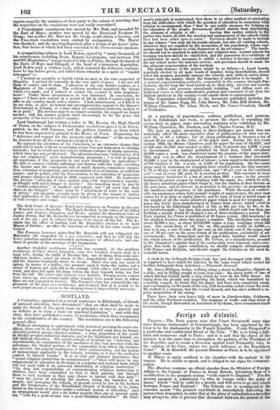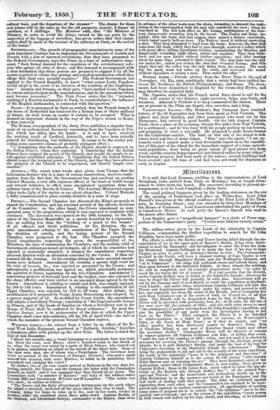ifirtigu guh (Catmint..
FRANCE.—The Paris papers state that Count Strogonoff, some time since Russian Ambassador at Constantinople, has been appointed by the Czar to be his Ambassador to the French Republic. Count Strogonoff is a particular and confidential friend of the Czar. "He is to bring a bril- liant and numerous staff to Paris; and it is said that the object of the mission is at the same time to strengthen the position of the President of the Republic, and to create a diversion against Lord Normanby, who, in the opinion of the Czar, enjoys too much influence at the Republican Court." M. de Kiaselefk the present Minister at Paris, is to be appointed to another court.
M. Thiers is again confined to his chamber with the malady in his tongue. He is unable to speak, and is obliged to UBC signs for communi- cation.
The Mon iteur contains an official circular from the Minister of Foreign Affairs to the Consuls of France in Great Britain, informing them of a modification in the passport system "with regard to England." For the present passport is substituted "a titre de voyage under the name of passe," which will be valid for a month, and will serve to go and returll between France and England." The Consuls are to recommend to the consular agents "the greatest exactitude in immediately delivering the passes when demanded, in order that at the place of embarkation a traveller may always be able to procure that document between the arrival of the railway train and the departure of the steamer." The charge for these new passes will be the same as for the old passports, namely, 6 francs 25 centimes, or 5 shillings. The Moniteur adds, that "the Minister of Finance, in order to avoid the delays caused in the sea ports by the inspection of the luggage of travellers, has given orders that that exami- nation shall be made at the termini of the railways at Paris, on the arrival of the trains."
SWITZERLAND. —Me growth of propagandist associations in some of the most important Cantons has so impressed the Governments of Austria and Prussia with a fear of renewed revolutions, that they have presented to the Federal Government, says the Times in a tone of authoritative state- ment, "their formal demand for the expulsion of the revolutionary refu- gees who agitate all sides of them ; and this demand is accompanied with a clear intimation that these powers are prepared to support it by all the means required to obtain that prompt and complete Rat-infection which they allege that their own security requires." The Federal Government has applied to the French Republic, to know "what course Louis Napoleon would adopt in the event of an invasion of the territory of the Confedera- tion." Austria and Prussia, on their part, "have invited Louis Napoleon to concur and participate in the remonstrances, and in the operations which may become necessary." The Paris Preen states that the "intended sendimg of a Russian Ambassador to Paris, to counterbalance the influence of the English Ambassador, is connected with this question."
ITALY. —It is announced in Paris as settled, that the French branch of the house of Rothschild has tendered for a Roman loan of thirty millions of francs, on such terms as render it certain to be accepted. What is deemed an important obstacle in the way of the Pope's return to Rome, is thus removed.
The Roman correspondent of the Daily Yews publishes a singular frag- ment of an ecclesiastical document emanating from the Conclave at Per- lid, which has fallen into his hands it is said to have received the revising touch of Cardinal Antonelli, and to have been actually printed for distribution, but withdrawn. It seems to be the recital pre- ceding some operative clauses of probably stringent effect- ' 1. Considering that the authority of the Church should be respected by the Italian Princes, whom they represent 2. Considering that the Italian Princes have usurped. the Rower of the Church, and taught the people to re- volt arinst established. principles. 3. Considering that the Italian Princes should respect the temporal goods of the Church, and that they have allowed the property of the Minch to be sequestered, and thereby taught com- munism.
Ausima.—The report some weeks since given from Vienna, that the Selavonian frontier was in a state of serious insurrection, receives confir- mation from the fact that the Government has just resolved on sending Colonel Mamula, a very able engineer officer, at the head of 6,000 troope and several batteries, to effect some unexplained operations from the military basis of the Beech° di Cattaro. The Austrian Ministerial organs either make light of the matter or are silent altogether. Colonel Mamula is fully commissioned to place certain districts in a state of siege.
Pmisma.—The Second Chamber has discussed the King's proposals to amend the Constitution, and has reversed several of the adverse decisions of its Committee : on the other hand, the Crown abandoned as non- essential some of the propositions which it was expected to maintain with obstinacy. The discussion was opened on the 26th January, by the Mi- nister of the Interior Manteuffel, in a speech described by a representa- tive as nothing less than the "holding of a pistol to the breasts"
cif all officials and timid politicians. At his dictation, the ca- pital amendments relating to the constitution of the Upper House, the abolition of entails, and the taxing powers of the Second Chamber, were postponed to the last The Chamber accepted the Royal amendments respecting the press, the responsibility of the Ministers, the time of summoning the Chambers, and the rivaring valid of Government ordinances issued pro tempore all of which its committee had rejected or materially amended : it adopted the amendment respecting electoral districts with an alteration conceded by the Crown. It then ad- journed till the evening. In the evening sitting the more essential amend- ments were debated. Amendment 15, creating a special high court for the trial of treason, &c., was rejected as presented by the Crown ; and subsequently a modification was agreed on' which practically postpones the question to future legislation by the two Chambers. Amendment 7, concerning projects of financial laws and the budget, were also rejected in the shape offered ; and were carried in an amended shape agreed to by the Crown. Amendment 4, relating to entails and fiefs, was simply rejected, by 169 to 146 votes. Amendment 8, relating to the constitution of the Upper Chamber, was rejected, by 216 to 96 votes. After debate, the modification of it proposed by Count Arnim Boizenburg was adopted, by a narrow majority of 12. As modified by Count Arnim, the amendment still admits a hereditary Peerage, consisting of "the Imperial noble houses in Prussia, and of the heads of families on whom a hereditary seat in the House of Peers shall be conferred by Royal ordinance." Its most dis- tinctive feature now is its postponement of the date at which the Upper Chamber shall come into existence, till the 7th of Apri11852—the date at which the mandate of the present Second Chamber expires.
WESTERN AFRICA.—An extract from a letter by an officer of the Se- cond West India Regiment, quartered at "Bathurst, Gambia," describes a disastrous affair with pirates up the river Bebe. The letter is dated the 21st of last December.
"About two months ago, a vessel belonging to a merchant here was trad- ing down the coast, near Bissao, about a hundred miles to the South of us, when the vessel was seized by a party of Black fellows, who turned out
be pirates, inhabiting an island at the mouth ot the River Sobs. Some of the crew were shot, one of whom was a Frenchman. The Governor here wrote an account to the Governor of Senegal, (French) who sent a small man-of-war steamer, with some Marines,. to assist us 111 punishing these scoundrels and retaking the vessel." By chance, two of our own vessels arrived at Bathurst in the two days fol- lowing, namely, the Teazer and the Centaur, the latter with the Commodore himself on board; and it was arranged that they should all go down. The Commodore took "a number of Marines" and arty of the soldiers under Captain Hill and Lieutenants M'Coint andhi'Laughlen. "The action was very short' in outline as follows."
" The Teaser and the Ruby (Frenchman) having gone up the creek where the isralta is situated., anchored off the place where they were to land. The Centaur, being too large to come up so far, sent up her boats, twelve in number, while she remained about three miles down. Captain Buckle, of the Centaur, and lieutenant Selwyn, commander of the Teaser, then went
in advance of the other boats near the shore, intending to demand the resti- tution of the vessel together with the men who murdered the crew ; when be was fired at. The ball took effect on Mr. Young, midshipman of the Cen.- taur' dangerously wounding him in the breast. The Tearer and Ruby, to... gether with the boats that had cannon., then opened a furious cannonade, which lasted nearly half-an-hour. The Natives stood it without answering, a shot They then attempted to land from the boats : however, the first that came near the busk which they had to pass through, received a volley which' took great effect, killing Lieutenant Crocket, commanding the Marines, ant dangerously wounding eight others, sailors and marines. They then with- drew, and our men landed without further opposition and after beating about for spine time, returned to their vessels. The first boat was the only one under fire, unless you reckon the shot that wounded Young ; and this single shot and the volley was the only firing from the enemy. The next day the party went ten miles up the creek, and recovered the vessel without opposition or seeing a man. Thus ended the affair."
BITENOS AYRES. —Private advices from the River Plate to the end of November, via Rio, state confidently that a treaty had been ratified be. tween Mr. Southern, the British Plenipotentiary, and Roses. The docu- ments had been despatched to England by the steam-ship Hydra, and' may therefore be expected daily. The Napoleon states that the French naval force about to sail for the Plata will consist of two frigates, eight corvettes, brigs, gun-boatwee nrd steamers. Admiral le Predour is to keep command of the station.
are at present in the Plata one frigate, two corvettes, and a brig.
Varreonvians ISLAND.—The Hudson's Bay Company have received letters, of the 3d September last, from their agent at Fort Victoria. The miners and their families, and other passengers who went out by the Harpooner, had arrived in good health. On the 14th August, Captain Grant chose a place at Sy-yousung, twenty-five miles from Fort Victoria, for a settlement ; and he was burry with his people putting up log-houses, and preparing to erect a saw-null. He proposed to make house-frames for the Californian market The land on that side of the island is rich where level and free of stony ridges. "But," says the agent, " I am ex- tremely sorry I cannot make a very favourable report as to the capabili- ties of this part of the island for the immediate support of a large agricul- tural population ; there being no great extent of open prairie free from wood, and the country being separated into limited vallies by stony ridges." Satisfactory progress had been made at the mines ; several buildings had been erected ; and 750 tons of coal had been got ready for shipment as early as August.



























 Previous page
Previous page